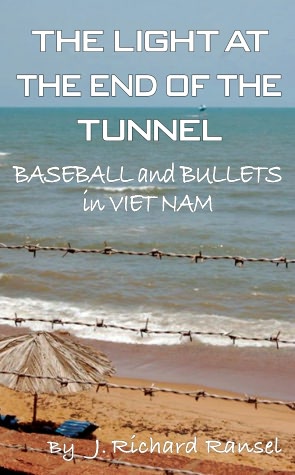The Light at the End of the Tunnel by J. Richard Ransel | Books in Review
J. Richard Ransel calls The Light at the End of the Tunnel: Baseball and Bullets in Vietnam (Shortimers Publishing, 326 pp., paper) a “biographical novel.” The book, which reads more like a memoir, is organized in small, pithy sections with headings such as “Drugs and Arson, ” “Red Cross Girls, ” and “Liska’s Whore.”
I thumbed through the book and thought I wouldn’t have to read it all the way through to write a decent review. But when I started reading Ransel’s “memoir, ” I enjoyed it so much I read the whole thing.
This “memoir” tells the story of Ransel’s tour of duty as a draftee in the Army serving in Vietnam in 1971 as a clerk and a lifeguard, even though he had been trained at Fort Monmouth Signal School in tactical microwave repair. The Army works in mysterious ways.
Because Ransel could type and because he was a trained lifeguard, when he reached Vietnam his assignment changed. Instead of being sent to Phu Bai, Ransel was assigned to the 12th Signal Group at My Khe, near Danang, on China Beach.
So Ransel went from Notre Dame Law School to being a clerk typist and go-fer for COL Philip Lowry. The sections in the book recounting Ransel’s duties under COL Lowry are a powerful reminder of my tour of duty during which I performed similar duties in 1966-67 for COL Eddy in the Inspector General’s Office in Saigon. I never learned to swim, so I was not assigned to be a lifeguard, and didn’t get to save any lives, which Ransel did.
I loved this book. It’s written with a lot of humor and tons of salty language, and there is evidence on every page that Ransel knows what he’s talking about. The book is informed by Ransel’s considerable humanity and sympathy for the Vietnamese people.
I especially enjoyed his tales of delivering orders from his colonel to other officers of lesser rank. Working for the Group Commander gave him the powers of that officer in certain circumstances. As Ransel puts it: “It was sort of ironic that a 21-year-old draftee could tell a lifetime officer what to do. And I didn’t get a big head about it. It was just another stupid part of the stupid war.”
I admit that Ransel was a better man than I. When I did a similar task for COL Eddy, my head did swell a hat size or two. Power did corrupt me—at least a little bit.
As the subtitle promises, this book delivers quite a large amount of baseball narrative. I never noticed baseball being played in-country during my thirteen months in Vietnam. Ransel sets this record straight. There was fast-pitch softball, and it was played seriously all over South Vietnam. I don’t know how much time the VC devoted to sports, but I suspect it was minimal.
Ransell wrung a few tears out of this reader when his narrative informed us that 12th Signal Group softball team was awarded the U. S. Armed Forces, Vietnam, trophy but only because the 101st Airborne Division team they were scheduled to play against in the Big Game went on a recon mission, which resulted in the deaths of eight members of their fast-pitch softball team.
The 12th Signal Group had the names of those who died engraved on the giant trophy. As Ransel puts it: “Just when you think you are going to do something important, reality sets in, war breaks out and tells you how insignificant you are.”
Ransel waits until late in the book before he gets to my favorite Vietnam War subject: Agent Orange. I have to confess my bias. I am dying of Agent Orange-caused multiple myeloma. Ransel’s Agent Orange section is detailed, hard-hitting and right on the money. He suggests that perhaps the U. S. government’s use of Agent Orange in Vietnam was a war crime. Who am I to argue with an attorney who has a law degree from Notre Dame? He makes the case over four well-reasoned pages filled with facts and figures.
Golf, Medgar Evers, and Robert Johnson (the blues singer) all get name checks in this perfect little biographical novel. I’ve added the book to my short list of REMF classics of the American War in Vietnam.
The “R” stands for “rear.” The “E” stands for “echelon.” I’ll let you figure out what the “MF” stands for. Hint—It doesn’t stand for “materiel finaglers.”
—David Willson

